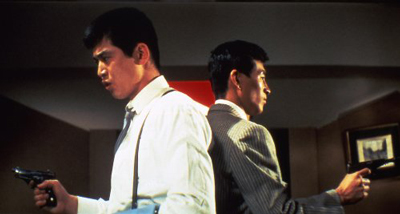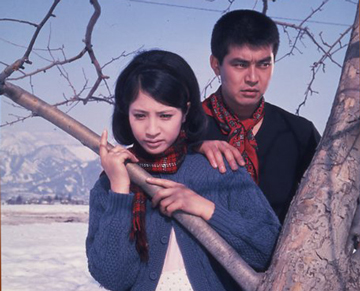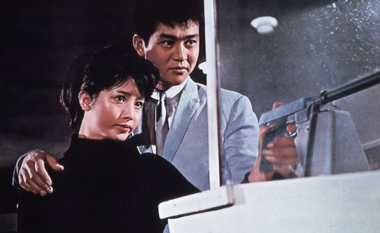
 |
|
|
|
The Japanese film industry had its share of rebel directors in the 1960s, but the powerful studios tolerated mavericks only when their films were consistently successful. Japan kept busy churning out two and three full features a week for a nation still not entirely wired for television. Over at Nikkatsu, director Seijun Suzuki felt that his potential was being wasted in program thrillers with assembly-line scripts. His low seniority didn't give him script or cast approval. With a small group of like-minded, ambitious writers, Suzuki had begun to doctor his scripts, or shoot scenes in a way not cleared by his production manager. The pictures improved, but not Suzuki's standing with the front office. 
Tokyo Drifter was conceived as a lightweight thriller to promote one of Nikkatsu's newest young discoveries, the handsome, boyish Tetsuya Watari. The plan was to make a straightforward drama about a young criminal's efforts to go straight and succeed romantically with his true love, a sensual but innocent nightclub singer. Seijun Suzuki was given the luxury of color and a slightly longer shooting schedule. Instead of playing it safe, he elected to radically alter the film's style. The basic storyline is unchanged, but everything else about Tokyo Drifter is designed to attract critical attention. Colors more gaudy than a Hollywood musical undermine the sober Yakuza themes, along with absurd action sequences and a nightclub that could only exist in an artist's fantasy. Tetsu Hondo, alias "The Phoenix" (Tetsuya Watari) is loyal to his benevolent crime boss Kurata (Ryuji Kita), who approves of Tetsu's longing for the beautiful singer Chiharu (Chieko Matsubara). When Kurata disbands his gang and goes legit Tetsu remains faithful, even submitting to a brutal beating by rival mobsters. That gang decides to steal a large office building belonging to Kurata, in a raid that results in the killing of a businessman and a secretary. Forced to leave Tokyo, Tetsu becomes involved in the problems of a Kurata ally in a Southern port city. His life is saved more than once by Kenji Aizawa (Hideaki Nitani), a worldly-wise ex- Yakuza who now functions as an independent agent, or "drifter". Kenji tells Tetsu that his loyalty is misplaced, that sooner or later even his beloved father figure Kurata will turn on him. Back in Tokyo, Kurata caves in to threats of blackmail by his rivals, who demand Tetsu's death. Tetsu doesn't believe it when the thug Tatsuzo, The Viper (Tamio Kawaji) tells him that he's been targeted by every hood in the city. Against Kenji's advice, he returns to the city to right wrongs and protect his beloved Chihara. 
We can well imagine Nikkatsu's frustration with director Suzuki after screening his finished Tokyo Drifter: the movie veers wildly from its mission to provide a feel-good acting showcase for the handsome Tetsuya Watari. But the star has only a handful of scenes with the film's leading lady, and none that set him up as a screen lover. Tetsu has determined that women have no place in his destiny as a true-blue lieutenant to the big shot Kurata. When Chihara sees Tetsu from the window of a train and cries out, he chooses to ignore her. With his who-cares-if-it's-combed hair and color-coordinated jackets, our rogue hero certainly looks like a cool customer. He nevertheless comes off as a creampuff next to Hideaki Nitani's stalwart Kenji, a realist with a big heart and a Bogart-like attitude toward trouble. Nitani had starred in Suzuki's Underworld Beauty, but Nikkatsu wanted to billboard young Watari as a romantic star, and generated a full promotional campaign stressing his relationship with Chieko Matsubara. Chihara cuts a fine figure as the anguished torch singer, yet Tetsu spends most of the movie distancing himself from her. And how macho can a Yakuza be, when he trades conversation with his fellow criminals about the merits of a particular electric hair dryer? Actually, it would be difficult for any rational character to emerge from director Suzuki's extreme stylization. Many of the sets are designer fantasies adapted from Pop Art and the esthetics of Japanese Manga action comics -- comics that one restless receptionist reads incessantly, laughing at the jokes. Rooms are often painted in bright colors, and some setups arrange the characters against flat backgrounds in ways that suggest a living comic book. Out in the snow-covered scenery, Suzuki will throw an unmotivated blue filter across the image, a wedge of color that has no meaning other than to disrupt the "natural" scene. Forget conventional realism -- the gangster hangouts and foreign-influenced nightclubs are pure fantasy. Multi-colored iron pipes crowd the key nightclub's staircases, and hoods strolling to the manager's office pass below a glass floor and stare upwards at club patrons dancing mindlessly away. The ballroom where Chihara belts out her songs is a vast, usually empty space that is painted a different bright color every time we see it. Suzuki uses this "interior landscape" as a cinematic laboratory for odd angles and expressive compositions. The only correlative in Hollywood pictures is another mostly empty ballroom in Jack Webb's Pete Kelly's Blues, that likewise serves as a stylized arena for an armed showdown. As if that weren't enough, Tokyo Drifter's Tetsu is frequently shown whistling and singing the main theme song, a ballad about, naturally enough, an alienated gunman. Like a singing cowboy, Tetsu warbles as he hikes through the snow or stalks an enemy with his gun drawn. Clearly not meant to be funny, these musical moments create a bizarre cultural collision: the sublime clashes with pure corn. Seijun Suzuki's play with these absurdities is largely successful. Eccentric comic relief is provided by the dandyish thug playfully named Tatsu, whose attempts to murder Tetsu repeatedly fail. Suzuki's ploy falters only once, in a somewhat tiresome barroom brawl in a "hick" town. American sailors and servicemen become an easy target in a fight apparently purposely staged to look fake. A row of B-girls cheers the home team ("G.I.'s are chicken!") and the foolish Americans end up in a pile outside the bar's western-style swinging doors, like something from a Popeye cartoon. 
What Tokyo Drifter has that Nikkatsu didn't see is a self-conscious awareness of its own status as a genre myth. It appears a reaction to the Pop Culture influences of1966, especially the stylish but ever-more juvenile spy spoof movies that came in the wake of the James Bond craze. In hindsight, Tokyo Drifter can be seen to continue the process of deconstructing the traditional Yakuza movie. The cynical treatment given notions of loyalty and honor would soon be exported from Japan to Italy, via Sergio Leone's Fistful of Dollars. Seijun Suzuki's visual stylistics -- wild art direction and playful eccentricity -- re-energize the Yakuza action genre. Criterion's Blu-ray of Tokyo Drifter is a vast improvement over their initial non-enhanced DVD offering of ten years ago. The film's bright colors come in an amusing variety of pastels and complementary tones that remind us of high-emotion sequences in Vincente Minnelli films, like the conclusion of Some Came Running. New extras give us the impression that director Seijun Suzuki jazzed up his routine assignments and jeopardized his career out of sheer artistic boredom. Speaking in a pair of interviews from the late 1990s, Suzuki explains that disobeying his employers was an artistic necessity that he never regretted. He complied with the edict to reprise the title tune "x" number of times in the movie, but his alterations to the tone of the Tetsu / Chihara romance defied the studio's instructions to billboard its new star personality. Interestingly, when selected scene stills are excerpted for use in Criterion's featurettes, Tokyo Drifter looks like an abstract exercise in composition, blocking and camera movement. The actual "action" in the final nightclub confrontation isn't particularly convincing, but the camera direction generates excitement on a sensual level: all those colors seem to swirl around in our heads. Also included is an original trailer, and an insert essay by Howard Hampton. It is essential reading for viewers confused by Seijun Suzuki's "jazz with a color camera" approach to the Yakuza thriller.
On a scale of Excellent, Good, Fair, and Poor,
Tokyo Drifter Blu-ray rates:
Reviews on the Savant main site have additional credits information and are often updated and annotated with reader input and graphics. Also, don't forget the 2011 Savant Wish List. T'was Ever Thus.
Review Staff | About DVD Talk | Newsletter Subscribe | Join DVD Talk Forum |
| ||||||||||||||||||